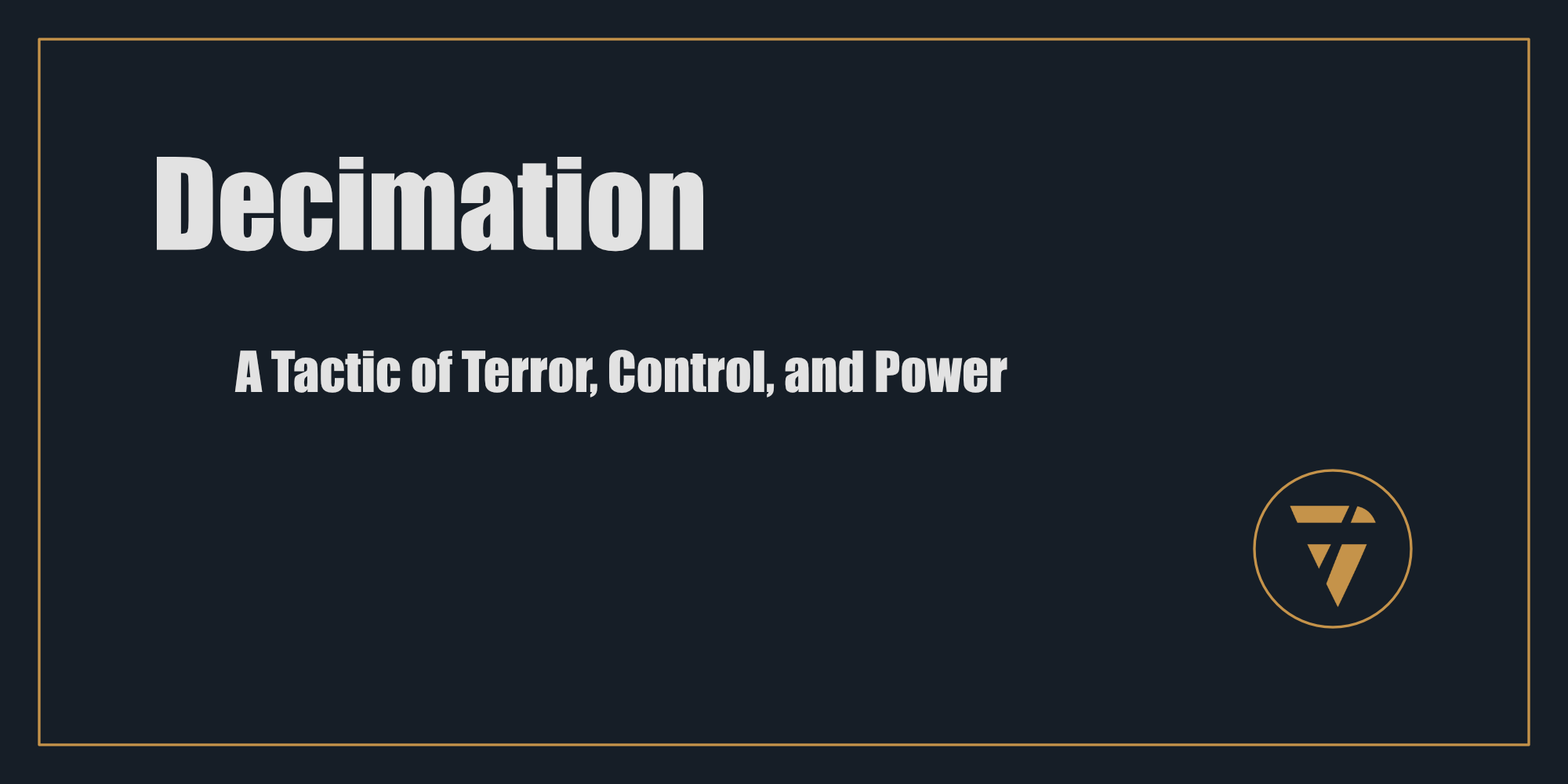Decimation

A Tactic of Terror, Control, and Power
The word decimation originates from the Latin decimatio, meaning "removal of a tenth." This punishment was a tool of Roman discipline, an extreme measure used to maintain obedience and loyalty within the ranks. The process was brutal: when a unit was deemed cowardly or mutinous, soldiers were divided into groups of ten, and one from each group was chosen by lot to be executed by their comrades. This ensured that the punishment was not only lethal but also psychologically devastating.
The origins of decimation trace back to the early Roman Republic, particularly under commanders like Fabius Maximus in the Second Punic War and Crassus during the Third Servile War against Spartacus. The message was clear: failure, disobedience, or cowardice would not just bring punishment but a collective reckoning. The threat of decimation ensured unit cohesion under extreme stress, turning terror into discipline.
Yet, the effectiveness of decimation was debated even in Rome. While it reinforced obedience, it also destroyed manpower, weakened morale, and was often seen as a desperate act of failed leadership. The punishment was used sparingly, largely fading as Rome transitioned from a Republic to an Empire, where more sophisticated methods of control—ranging from targeted assassinations to political purges—became the norm.
Decimation as a Strategy of Power
Beyond the battlefield, decimation took new forms throughout history. In Stalin’s USSR, the Great Purge functioned as a kind of political decimation, where loyalty was determined not by merit but by survival in an arbitrary cycle of executions. Mao’s Cultural Revolution similarly "decimated" intellectuals, military leaders, and political opponents. The principle remained the same: cut down a portion of the whole, instill fear, and watch obedience follow.
Even in modern corporate culture, decimation persists in a different form—mass firings, public scapegoating of executives, and the systematic culling of perceived "dead weight" employees. The same ancient logic applies: punish a few brutally enough, and the rest will fall in line.
The Modern Political Decimation of America
Fast forward to today, and the principle of decimation is at work in American politics—not in the form of physical executions, yet, but through a systematic dismantling of political opposition. The goal remains unchanged: create fear, demand loyalty, and consolidate power.
- The Purging of Dissent
- The removal of political figures through weaponized legal cases, internal party purges, and the forced resignation of officials echoes the Roman method of making an example of a few to control the many.
- Whistleblowers, investigative journalists, and political opponents often face financial ruin, media blackouts, and social ostracization.
- The Fear of Speaking Out
- Just as Roman soldiers feared the random selection of death in decimation, modern politicians, bureaucrats, and even corporate leaders fear cancellation, public humiliation, or legal entanglement if they step out of line.
- The uncertainty—who will be next?—is what makes this method so powerful. If the punishment appears random or selectively enforced, then everyone becomes a suspect, and fear polices behaviour better than any written law.
- Weaponization of Justice
- In Ancient Rome, the Senate and military leaders used legal mechanisms to justify purges. Today, institutions like Congress, intelligence agencies, and the judiciary are wielded like swords to eliminate rivals.
- Investigations and trials—selectively enforced—become the new method of political assassination.
- Media as the Enforcer
- In Rome, public executions were performed for spectacle, reinforcing obedience. Today, the media plays the role of the Colosseum, where careers and reputations are slaughtered for mass consumption.
- The ‘Decimation’ of the Electoral Process
- Rules around voting, districting, and legal challenges create a system where only the most "loyal" survive, ensuring that elections become performative rather than representative.
- Political parties increasingly function not as democratic institutions but as enforcement mechanisms for ideological purity.
History Repeats with New Weapons
The essence of decimation has never disappeared—it has evolved. The Roman legions feared the random hand of fate choosing one in ten to die, while today’s political and corporate elites fear the silent mechanisms of legal, economic, and social annihilation. The same strategic logic remains: eliminate a few, make an example of them, and watch the rest fall in line.
As Rome fell, its old systems of control fractured, giving rise to new forms of governance, often more brutal and arbitrary than before. If history is any indication, the decimation of American politics is not the end of a phase, but a precursor to a deeper transformation, one that could either result in rebirth or collapse. The real question is, who gets to hold the knife next?
News is pouring in about potential layoffs of probationary CDC employees. Officials were told to rank 10% of their probationary staff as mission-critical, 50% as “important” and 40% as not mission-critical.
— Alt CDC (they/them) (@altcdc.bsky.social) 2025-02-06T20:43:33.626Z
When I saw this, I thought, decimation is still an effective tactic apparently. Except they're killing off 40% of us. And the rest will fall in line. We are not mission-critical.
This is what I’m working on. Tell me what you think, I enjoy the conversation! Subscribe and follow the work in real time.
Thanks!
B

Decimation was Rome’s tool of control, kill one in ten, and the rest obey. Today, political and corporate elites use legal, financial, and media decimation to silence dissent. Fear is the weapon. Compliance is the goal. Rome may have fallen, but its tactics remain, and a dark empire rises.
PS -






